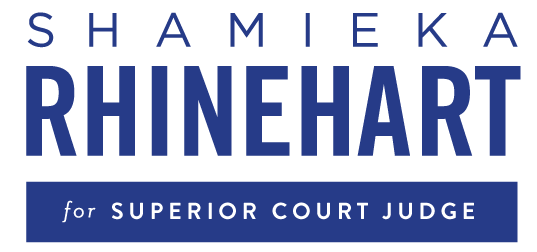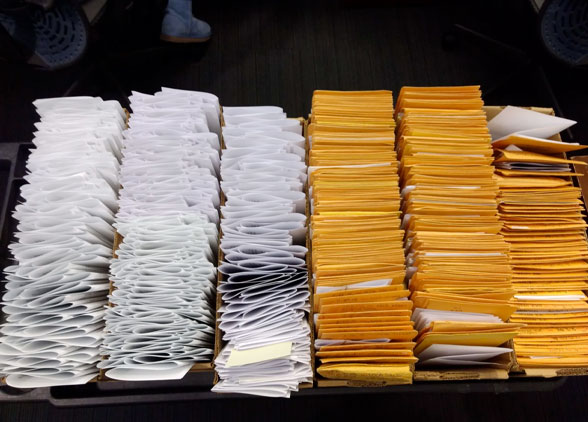by
Nearly six hundred outstanding traffic fines were dismissed in a Durham courtroom Monday afternoon in an effort to help people get their driver’s licenses restored.
On average, the charges were thirteen-and-a-half years old, but some stretched back a quarter of a century. In every case, the person has had their license suspended for failing to pay a ticket for at least two years.
It took District Court Judge Shamieka Rhinehart an hour to shuffle through all the paperwork, occasionally looking up with a smile at those who waited it out or to share which letter of the alphabet she had reached.
The dismissals were part of a massive relief effort started under former District Attorney Roger Echols and continued under Satana Deberry, who was sworn into the role two weeks ago. In a quiet, third-floor courtroom Monday, Deberry made a motion for all 559 fines to be remitted.
In making the motion, Deberry alluded to the biblical Year of Jubilee, in which slaves were freed and all property reverted back to its original owner. Dismissing the fines is supported by statute, she said, but it is also “ethical and fair” because the debt is largely the burden of people who may never be able to pay it.
“The proper administration of justice requires resolution of these cases,” she said.
It was the third dismissal docket of its kind over the past few weeks. So far, 636 people with 864 charges have seen $148,292 in fines remitted, according to Ryan Smith, director of the Durham Innovation Team, which for a year has focused on ways to reduce economic barriers for justice-involved people in Durham.
Smith noted the quiet of the courtroom—just the shuffling of papers and occasional conversations shushed by a bailiff—relative to the impact of what was happening there.
The new Durham Expungement and Restoration program, or DEAR, an initiative that spun off from the I-Team’s work on a license amnesty program in 2017, identified more than eleven thousand people eligible to have outstanding fines dropped. That group was randomly divided into fifty-two groups.
The goal is to hold a dismissal docket for one group every week (two groups were processed this week). Only people whose licenses have been suspended for at least two years and people without “high-risk” charges, such as DWI and fleeing arrest, included in the list. People can also go through the DEAR program for help getting their licenses restored outside of the weekly motions.
Housed on the sixth floor of the courthouse, the DEAR program is a collaboration between the city of Durham, courts, the NC Justice Center, Legal Aid, NC Equal Access to Justice Commission, NC Pro Bono Resource Center, local law schools, and Code for Durham. Attorneys give clients free help with driver’s license restoration, expungements, and certificates of relief.
Daniel Bowes, a staff attorney with the NC Justice Center who is working with the DEAR program, said the initiative is ambitious. While other places want “an ounce of flesh” in exchange for relief from the collateral consequences of court involvement, Durham is recognizing that the larger community—not only the people seeing their fines dismissed—benefits by relieving them of this debt and letting them get a driver’s license again, he said.
Forty-three states revoke licenses over unpaid fines and fees, but in North Carolina, that revocation is automatic and indefinite. State law requires that licenses be automatically revoked for nonpayment of a traffic ticket forty days after a court judgment is entered, but the law doesn’t require a hearing to determine whether the person is capable of paying the fines or fees levied.
Earlier this year, the ACLU, the ACLU of North Carolina, the Southern Poverty Law Center, and the Southern Coalition for Social Justice sued the state DMV, saying that provision violates North Carolinians’ Fourteenth Amendment rights to due process and equal protection under the law.
Court fees have increased 400 percent over the past twenty years in North Carolina. That money—in the form of charges like arrest fees, failure to appear fees, and default costs of court charges for anyone who pleads guilty or is convicted—go toward public schools, law enforcement, and the state’s general fund.
A law that took effect in 2017 required judges who want to waive fines or fees to notify any agency that would lose out on revenue (the state’s Administrative Office of the Courts created a workaround by issuing a memo giving standing notice that costs might be waived). Since 2015, the state has also published data on how often individual judges waive court costs.
About fifty-four thousand people have had their licenses suspended due to traffic charges originating in Durham County—either because they didn’t show up to court or they didn’t pay a ticket. About three-quarters are people of color, according to the Durham I-Team.
Monday’s docket largely included charges for driving without a license or driving with a revoked license. Almost no one whose charges were dismissed Monday afternoon came for the occasion. And that was kind of the point—for people to not have to find a way to get to court when they have already paid the price of having their licenses suspended.
When the I-Team and the District Attorney’s Office ran their amnesty program in 2017, they asked people to send basic information by text to see if they were eligible for relief. That was far more successful than previous programs, which required people to come to the courthouse, but about 40 percent of people ended up being ineligible, Smith says.
The aim of the effort is for the DEAR program and its partners to identify eligible people based on court records and automatically move their cases for relief. That’s proving to be more efficient but presents another challenge: There’s no way to tell people they are one step closer to getting their driver’s license back. In most cases, the only contact information available is a person’s last known address, which could be decades old. (The county does offer court date reminders via text, but you have to sign up).
So, DEAR plans to launch an online portal in coming weeks and—with the help of a community outreach team—drive people to the site to see if their charges have already been dismissed or are coming up on a dismissal docket.
According to the I-Team, driving with a revoked license is the seventh most common charge for people in the Durham jail. Even without a valid license, people still need to get around—to work, doctor’s appointments, or for child care.
Laura Holland, a DEAR attorney who works with the NC Justice Center, says in her three years working on license restoration, she’s often seen people who had no choice but to take a risk and drive unlicensed. Others use costly rideshare services to get where they need to go or endure longer commutes stringing together rides from friends, buses, and walking. The case that stuck with her most was a woman whose license had been suspended for twelve years over an unpaid ticket. Without a license, she couldn’t work. After visiting the DEAR office, she was able to go to the DMV and get a new license.
“I’ve seen how not having a license prevents someone from getting employment and housing and leads to this cycle of hopelessness,” Holland said.

